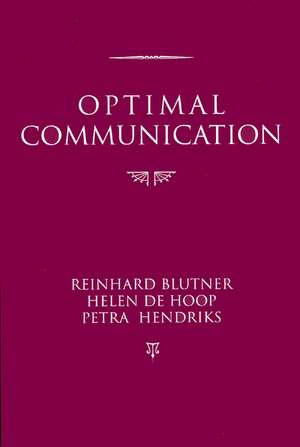Optimal Communicaton: Lecture Notes, cartea 177
Editat de Reinhard Blutner, Helen de Hoop, Petra Hendriksen Limba Engleză Hardback – 4 sep 2007
This volume explores how the effectiveness of communication is shaped by aspects of semantics and pragmatics such as compositionality, the role of the speaker and hearer, and the acquisition of meaning. Optimal Communication surveys recent research in the fields of syntax, semantics, and pragmatics, and draws from optimality theory to argue that optimal meanings result from a compromise between competing constraints. Optimal Communication will be an invaluable resource for students in cognitive science, linguistics, and natural language semantics.
Din seria Lecture Notes
- 5%
 Preț: 256.06 lei
Preț: 256.06 lei - 5%
 Preț: 320.58 lei
Preț: 320.58 lei - 5%
 Preț: 274.10 lei
Preț: 274.10 lei - 5%
 Preț: 254.67 lei
Preț: 254.67 lei - 5%
 Preț: 326.49 lei
Preț: 326.49 lei - 5%
 Preț: 269.18 lei
Preț: 269.18 lei - 5%
 Preț: 270.72 lei
Preț: 270.72 lei - 5%
 Preț: 252.43 lei
Preț: 252.43 lei - 5%
 Preț: 256.57 lei
Preț: 256.57 lei - 5%
 Preț: 249.88 lei
Preț: 249.88 lei - 5%
 Preț: 283.98 lei
Preț: 283.98 lei - 5%
 Preț: 302.53 lei
Preț: 302.53 lei - 5%
 Preț: 299.18 lei
Preț: 299.18 lei - 5%
 Preț: 279.37 lei
Preț: 279.37 lei - 5%
 Preț: 309.46 lei
Preț: 309.46 lei - 5%
 Preț: 306.94 lei
Preț: 306.94 lei - 20%
 Preț: 132.51 lei
Preț: 132.51 lei - 20%
 Preț: 145.93 lei
Preț: 145.93 lei -
 Preț: 175.00 lei
Preț: 175.00 lei - 5%
 Preț: 404.82 lei
Preț: 404.82 lei - 5%
 Preț: 417.60 lei
Preț: 417.60 lei - 5%
 Preț: 374.93 lei
Preț: 374.93 lei - 5%
 Preț: 310.33 lei
Preț: 310.33 lei - 5%
 Preț: 402.69 lei
Preț: 402.69 lei - 5%
 Preț: 332.58 lei
Preț: 332.58 lei - 5%
 Preț: 348.14 lei
Preț: 348.14 lei - 5%
 Preț: 424.32 lei
Preț: 424.32 lei - 5%
 Preț: 559.32 lei
Preț: 559.32 lei - 5%
 Preț: 391.48 lei
Preț: 391.48 lei - 5%
 Preț: 145.48 lei
Preț: 145.48 lei - 18%
 Preț: 178.07 lei
Preț: 178.07 lei - 16%
 Preț: 183.20 lei
Preț: 183.20 lei - 30%
 Preț: 172.89 lei
Preț: 172.89 lei - 30%
 Preț: 207.05 lei
Preț: 207.05 lei - 5%
 Preț: 26.04 lei
Preț: 26.04 lei -
 Preț: 215.81 lei
Preț: 215.81 lei - 18%
 Preț: 145.17 lei
Preț: 145.17 lei - 18%
 Preț: 119.60 lei
Preț: 119.60 lei - 16%
 Preț: 287.67 lei
Preț: 287.67 lei - 35%
 Preț: 172.00 lei
Preț: 172.00 lei - 21%
 Preț: 391.55 lei
Preț: 391.55 lei - 16%
 Preț: 143.04 lei
Preț: 143.04 lei - 17%
 Preț: 148.58 lei
Preț: 148.58 lei - 14%
 Preț: 161.02 lei
Preț: 161.02 lei - 28%
 Preț: 205.21 lei
Preț: 205.21 lei - 34%
 Preț: 185.38 lei
Preț: 185.38 lei - 15%
 Preț: 132.23 lei
Preț: 132.23 lei - 21%
 Preț: 317.77 lei
Preț: 317.77 lei - 15%
 Preț: 173.28 lei
Preț: 173.28 lei
Preț: 340.90 lei
Preț vechi: 431.75 lei
-21% Nou
Puncte Express: 511
Preț estimativ în valută:
65.23€ • 68.29$ • 53.97£
65.23€ • 68.29$ • 53.97£
Carte indisponibilă temporar
Doresc să fiu notificat când acest titlu va fi disponibil:
Se trimite...
Preluare comenzi: 021 569.72.76
Specificații
ISBN-13: 9781575865133
ISBN-10: 1575865130
Pagini: 300
Dimensiuni: 152 x 229 x 20 mm
Greutate: 0.43 kg
Ediția:New.
Editura: Center for the Study of Language and Inf
Colecția Center for the Study of Language and Inf
Seria Lecture Notes
ISBN-10: 1575865130
Pagini: 300
Dimensiuni: 152 x 229 x 20 mm
Greutate: 0.43 kg
Ediția:New.
Editura: Center for the Study of Language and Inf
Colecția Center for the Study of Language and Inf
Seria Lecture Notes
Notă biografică
Reinhard Blutner is Privatdozent of Theoretical Linguistics at Humboldt University in Berlin and lecturer in Artificial Intelligence and Cognitive Philosophy at the University of Amsterdam. Helen de Hoop and Petra Hendriks are associate professors of linguistics at the Center for Language Studies at Radboud University Nijmegen in the Netherlands.
Cuprins
Acknowledgments
Preface
1. Introduction
1.1 Optimality Theory as a Theory of Knowledge
1.2 Basic Concepts of OT
1.3 Language Universals and Language Variation
1.4 A Brief History of OT
1.5 Optimization of Interpretation
1.6 Bidirectional Optimization
1.7 The Architecture of Grammar
1.8 Relation to Other Semantic Frameworks
1.9 An Overview of the Book
2. Recoverability
2.1 Introduction
2.2 Movement
2.3 Deletion
2.4 Interpreting Comparatives
3. Compositionality
3.1 Introduction
3.2 Scrambling of Definites: Productive and Interpretive Optimization
3.2.1 Optional Scrambling of Definites in Dutch
3.2.2 An OT Syntactic Analysis of Scrambling Definites
3.2.3 An OT semantic Analysis of Scrambling Definites
3.2.4 Concluding Remarks
3.3 Optimality Theoretic Semantics
3.3.1 Compositionality and the Role of Context
3.3.2 Compositionality: a Violable Constraint as well?
3.3.3 Interpretive Optimization of Nominal Anaphora
3.3.4 Interpretive Optimization of Comparatives
3.3.5 Interpretive Optimization of Temporal Anaphora
3.3.6 Adverbial Quantification
3.4 Compositionality and Bidirectionality
3.5 Scrambling Revisited: a Bidirectional OT Analysis
3.6 Summary
4. Bidirectionality
4.1 Introduction
4.2 Mental Models and Natural Language Interpretation
4.3 The Non-Monotonicity of Invited Inferences
4.4 Blocking
4.5 Conversational Implicature, Pragmatic Strengthening, and Bidirectional OT
4.6 An Example: Negative Strengthening
4.7 Summary
5. Learning
5.1 Introduction
5.2 Constraint Demotion
5.3 The Bootstrap Idea for Learning Hidden Structure
5.4 Pattern Association and Bidirectional Learning
5.5 Acquisition of Indefinite Subject and Object Interpretation in Dutch
5.6 Children's Optimal Interpretation of Pronouns
5.7 The Gradual Learning Algorithm and bidirectional Learning
5.8 Bidirectionality, Recursion, and Evolutionary Learning
5.9 Summary
6. Foundations
6.1 Introduction
6.2 An Architecture of Cognition
6.3 Smolensky's Tensor Product Representation
6.4 Harmonic Grammar--OT's Predecessor
6.5 Summary
References
Index
4. Bidirectionality
5. Learning
6. Foundations
References
Index
